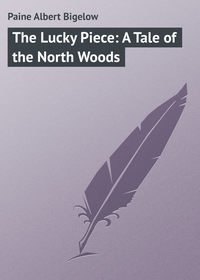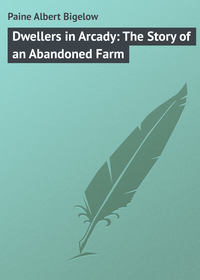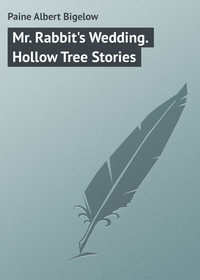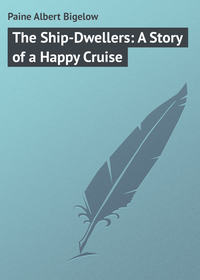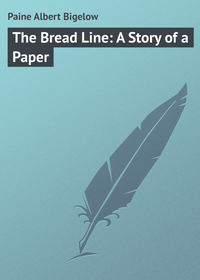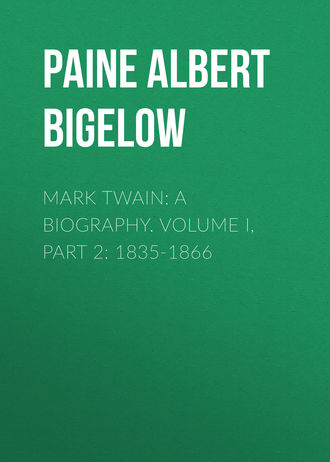 полная версия
полная версияMark Twain: A Biography. Volume I, Part 2: 1835-1866
It was during one of their walks to the tower that they planned a far more extraordinary undertaking—nothing less, in fact, than a walk from Hartford to Boston. This was early in November. They did not delay the matter, for the weather was getting too uncertain.
Clemens wrote Redpath:
DEAR REDPATH,—Rev. J. H. Twichell and I expect to start at 8 o'clock Thursday morning to walk to Boston in twenty four hours—or more. We shall telegraph Young's Hotel for rooms Saturday night, in order to allow for a low average of pedestrianism.
It was half past eight on Thursday morning, November 12, 1874, that they left Twichell's house in a carriage, drove to the East Hartford bridge, and there took to the road, Twichell carrying a little bag and Clemens a basket of lunch.
The papers had got hold of it by this time, and were watching the result. They did well enough that first day, following the old Boston stage road, arriving at Westford about seven o'clock in the evening, twenty-eight miles from the starting-point. There was no real hotel at Westford, only a sort of tavern, but it afforded the luxury of rest. "Also," says Twichell, in a memoranda of the trip, "a sublimely profane hostler whom you couldn't jostle with any sort of mild remark without bringing down upon yourself a perfect avalanche of oaths."
This was a joy to Clemens, who sat behind the stove, rubbing his lame knees and fairly reveling in Twichell's discomfiture in his efforts to divert the hostler's blasphemy. There was also a mellow inebriate there who recommended kerosene for Clemens's lameness, and offered as testimony the fact that he himself had frequently used it for stiffness in his joints after lying out all night in cold weather, drunk: altogether it was a notable evening.
Westford was about as far as they continued the journey afoot. Clemens was exceedingly lame next morning, and had had a rather bad night; but he swore and limped along six miles farther, to North Ashford, then gave it up. They drove from North Ashford to the railway, where Clemens telegraphed Redpath and Howells of their approach. To Redpath:
We have made thirty-five miles in less than five days. This demonstrates that the thing can be done. Shall now finish by rail. Did you have any bets on us?
To Howells:
Arrive by rail at seven o'clock, the first of a series of grand annual pedestrian tours from Hartford to Boston to be performed by us. The next will take place next year.
Redpath read his despatch to a lecture audience, with effect. Howells made immediate preparation for receiving two way-worn, hungry men. He telegraphed to Young's Hotel: "You and Twichell come right up to 37 Concord Avenue, Cambridge, near observatory. Party waiting for you."
They got to Howells's about nine o'clock, and the refreshments were waiting. Miss Longfellow was there, Rose Hawthorne, John Fiske, Larkin G. Mead, the sculptor, and others of their kind. Howells tells in his book how Clemens, with Twichell, "suddenly stormed in," and immediately began to eat and drink:
I can see him now as he stood up in the midst of our friends, with his head thrown back, and in his hand a dish of those escalloped oysters without which no party in Cambridge was really a party, exulting in the tale of his adventure, which had abounded in the most original characters and amusing incidents at every mile of their progress.
Clemens gave a dinner, next night, to Howells, Aldrich, Osgood, and the rest. The papers were full of jokes concerning the Boston expedition; some even had illustrations, and it was all amusing enough at the time.
Next morning, sitting in the writing-room of Young's Hotel, he wrote a curious letter to Mrs. Clemens, though intended as much for Howells and Aldrich as for her. It was dated sixty-one years ahead, and was a sort of Looking Backwards, though that notable book had not yet been written. It presupposed a monarchy in which the name of Boston has been changed to "Limerick," and Hartford to "Dublin." In it, Twichell has become the "Archbishop of Dublin," Howells "Duke of Cambridge," Aldrich "Marquis of Ponkapog," Clemens the "Earl of Hartford." It was too whimsical and delightful a fancy to be forgotten.—[This remarkable and amusing document will be found under Appendix M, at the end of last volume.]
A long time afterward, thirty-four year, he came across this letter. He said:
"It seems curious now that I should have been dreaming dreams of a future monarchy and never suspect that the monarchy was already present and the Republic a thing of the past."
What he meant, was the political succession that had fostered those commercial trusts which, in turn, had established party dominion.
To Howells, on his return, Clemens wrote his acknowledgments, and added:
Mrs. Clemens gets upon the verge of swearing, and goes tearing around in an unseemly fury when I enlarge upon the delightful time we had in Boston, and she not there to have her share. I have tried hard to reproduce Mrs. Howells to her, and have probably not made a shining success of it.
XCVIII
"OLD TIMES ON THE MISSISSIPPI"
Howells had been urging Clemens to do something more for the Atlantic, specifically something for the January number. Clemens cudgeled his brains, but finally declared he must give it up:
Mrs. Clemens has diligently persecuted me day by day with urgings to go to work and do that something, but it's no use. I find I can't. We are in such a state of worry and endless confusion that my head won't go.
Two hours later he sent another hasty line:
I take back the remark that I can't write for the January number, for Twichell and I have had a long walk in the woods, and I got to telling him about old Mississippi days of steam-boating glory and grandeur as I saw them (during four years) from the pilot-house. He said, "What a virgin subject to hurl into a magazine!" I hadn't thought of that before. Would you like a series of papers to run through three months or six or nine—or about four months, say?
Howells welcomed this offer as an echo of his own thought. He had come from a piloting family himself, and knew the interest that Mark Twain could put into such a series.
Acting promptly under the new inspiration, Clemens forthwith sent the first chapter of that monumental, that absolutely unique, series of papers on Mississippi River life, which to-day constitutes one of his chief claims to immortality.
His first number was in the nature of an experiment. Perhaps, after all, the idea would not suit the Atlantic readers.
"Cut it, scarify it, reject it, handle it with entire freedom," he wrote, and awaited the result.
The "result" was that Howells expressed his delight:
The piece about the Mississippi is capital. It almost made the water in our ice-pitcher muddy as I read it. I don't think I shall meddle much with it, even in the way of suggestion. The sketch of the low-lived little town was so good that I could have wished there was more of it. I want the sketches, if you can make them, every month.
Mark Twain was now really interested in this new literary venture. He was fairly saturated with memories. He was writing on the theme that lay nearest to his heart. Within ten days he reported that he had finished three of the papers, and had begun the fourth.
And yet I have spoken of nothing but piloting as a science so far, and I doubt if I ever get beyond that portion of my subject. And I don't care to. Any Muggins can write about old days on the Mississippi of five hundred different kinds, but I am the only man alive that can scribble about the piloting of that day, and no man has ever tried to scribble about it yet. Its newness pleases me all the time, and it is about the only new subject I know of.
He became so enthusiastic presently that he wanted to take Howells with him on a trip down the Mississippi, with their wives for company, to go over the old ground again and obtain added material enough for a book. Howells was willing enough—agreed to go, in fact—but found it hard to get away. He began to temporize and finally backed out. Clemens tried to inveigle Osgood into the trip, but without success; also John Hay, but Hay had a new baby at his house just then—"three days old, and with a voice beyond price," he said, offering it as an excuse for non-acceptance. So the plan for revisiting the river and the conclusion of the book were held in abeyance for nearly seven years.
Those early piloting chapters, as they appeared in the Atlantic, constituted Mark Twain's best literary exhibit up to that time. In some respects they are his best literature of any time. As pictures of an intensely interesting phase of life, they are so convincing, so real, and at the same time of such extraordinary charm and interest, that if the English language should survive a thousand years, or ten times as long, they would be as fresh and vivid at the end of that period as the day they were penned. In them the atmosphere of, the river and its environment—its pictures, its thousand aspects of life—are reproduced with what is no less than literary necromancy. Not only does he make you smell the river you can fairly hear it breathe. On the appearance of the first number John Hay wrote:
"It is perfect; no more nor less. I don't see how you do it," and added, "you know what my opinion is of time not spent with you."
Howells wrote:
You are doing the science of piloting splendidly. Every word interesting, and don't you drop the series till you've got every bit of anecdote and reminiscence into it.
He let Clemens write the articles to suit himself. Once he said:
If I might put in my jaw at this point I should say, stick to actual fact and character in the thing and give things in detail. All that belongs to the old river life is novel, and is now mostly historical. Don't write at any supposed Atlantic audience, but yarn it off as if into my sympathetic ear.
Clemens replied that he had no dread of the Atlantic audience; he declared it was the only audience that did not require a humorist to "paint himself striped and stand on his head to amuse it."
The "Old Times" papers ran through seven numbers of the Atlantic. They were reprinted everywhere by the newspapers, who in that day had little respect for magazine copyrights, and were promptly pirated in book form in Canada. They added vastly to Mark Twain's literary capital, though Howells informs us that the Atlantic circulation did not thrive proportionately, for the reason that the newspapers gave the articles to their readers from advanced sheets of the magazine, even before the latter could be placed on sale. It so happened that in the January Atlantic, which contained the first of the Mississippi papers, there appeared Robert Dale Owen's article on "Spiritualism," which brought such humility both to author and publisher because of the exposure of the medium Katie King, which came along while the magazine was in press. Clemens has written this marginal note on the opening page of the copy at Quarry Farm:
While this number of the Atlantic was being printed the Katie King manifestations were discovered to be the cheapest, wretchedest shams and frauds, and were exposed in the newspapers. The awful humiliation of it unseated Robert Dale Owen's reason, and he died in the madhouse.
XCIX A TYPEWRITER, AND A JOKE ON ALDRICH
It was during the trip to Boston with Twichell that Mark Twain saw for the first time what was then—a brand-new invention, a typewriter; or it may have been during a subsequent visit, a week or two later. At all events, he had the machine and was practising on it December 9, 1874, for he wrote two letters on it that day, one to Howells and the other to Orion Clemens. In the latter he says:
I am trying to get the hang of this new-fangled writing-machine, but am not making a shining success of it. However, this is the first attempt I ever have made, and yet I perceive that I shall soon easily acquire a fine facility in its use. I saw the thing in Boston the other day and was greatly taken with it.
He goes on to explain the new wonder, and on the whole his first attempt is a very creditable performance. With his usual enthusiasm over an innovation, he believes it is going to be a great help to him, and proclaims its advantages.
This is the letter to Howells, with the errors preserved:
You needn't answer this; I am only practicing to get three; anothe slip-up there; only practici?ng ti get the hang of the thing. I notice I miss fire & get in a good many unnecessary letters & punctuation marks. I am simply using you for a target to bang at. Blame my cats, but this thing requires genius in order to work it just right.
In an article written long after he tells how he was with Nasby when he first saw the machine in Boston through a window, and how they went in to see it perform. In the same article he states that he was the first person in the world to apply the type-machine to literature, and that he thinks the story of Tom Sawyer was the first type-copied manuscript. —[Tom Sawyer was not then complete, and had been laid aside. The first type-copied manuscript was probably early chapters of the Mississippi story, two discarded typewritten pages of which still exist.]
The new enthusiasm ran its course and died. Three months later, when the Remington makers wrote him for a recommendation of the machine, he replied that he had entirely stopped using it. The typewriter was not perfect in those days, and the keys did not always respond readily. He declared it was ruining his morals—that it made him "want to swear." He offered it to Howells because, he said, Howells had no morals anyway. Howells hesitated, so Clemens traded the machine to Bliss for a side-saddle. But perhaps Bliss also became afraid of its influence, for in due time he brought it back. Howells, again tempted, hesitated, and this time was lost. What eventually became of the machine is not history.
One of those, happy Atlantic dinners which Howells tells of came about the end of that year. It was at the Parker House, and Emerson was there; and Aldrich, and the rest of that group.
"Don't you dare to refuse the invitation," said Howells, and naturally Clemens didn't, and wrote back:
I want you to ask Mrs. Howells to let you stay all night at the Parker House and tell lies and have an improving time, and take breakfast with me in the morning. I will have a good room for you and a fire. Can't you tell her it always makes you sick to go home late at night or something like that? That sort of thing arouses Mrs. Clemens's sympathies easily.
Two memories of that old dinner remain to-day. Aldrich and Howells were not satisfied with the kind of neckties that Mark Twain wore (the old-fashioned black "string" tie, a Western survival), so they made him a present of two cravats when he set out on his return for Hartford. Next day he wrote:
You and Aldrich have made one woman deeply and sincerely grateful —Mrs. Clemens. For months—I may even say years—she has shown an unaccountable animosity toward my necktie, even getting up in the night to take it with the tongs and blackguard it, sometimes also getting so far as to threaten it.
When I said you and Aldrich had given me two new neckties, and that they were in a paper in my overcoat pocket, she was in a fever of happiness until she found I was going to frame them; then all the venom in her nature gathered itself together; insomuch that I, being near to a door, went without, perceiving danger.
It is recorded that eventually he wore the neckties, and returned no more to the earlier mode.
Another memory of that dinner is linked to a demand that Aldrich made of Clemens that night, for his photograph. Clemens, returning to Hartford, put up fifty-two different specimens in as many envelopes, with the idea of sending one a week for a year. Then he concluded that this was too slow a process, and for a week sent one every morning to "His Grace of Ponkapog."
Aldrich stood it for a few days, then protested. "The police," he said, "are in the habit of swooping down upon a publication of that sort."
On New-Year's no less than twenty pictures came at once—photographs and prints of Mark Twain, his house, his family, his various belongings. Aldrich sent a warning then that the perpetrator of this outrage was known to the police as Mark Twain, alias "The Jumping Frog," a well-known California desperado, who would be speedily arrested and brought to Ponkapog to face his victim. This letter was signed "T. Bayleigh, Chief of Police," and on the outside of the envelope there was a statement that it would be useless for that person to send any more mail-matter, as the post-office had been blown up. The jolly farce closed there. It was the sort of thing that both men enjoyed.
Aldrich was writing a story at this time which contained some Western mining incident and environment. He sent the manuscript to Clemens for "expert" consideration and advice. Clemens wrote him at great length and in careful detail. He was fond of Aldrich, regarding him as one of the most brilliant of men. Once, to Robert Louis Stevenson, he said:
"Aldrich has never had his peer for prompt and pithy and witty and humorous sayings. None has equaled him, certainly none has surpassed him, in the felicity of phrasing with which he clothed these children of his fancy. Aldrich is always brilliant; he can't help it; he is a fire-opal set round with rose diamonds; when he is not speaking you know that his dainty fancies are twinkling and glimmering around in him; when he speaks the diamonds flash. Yes, he is always brilliant, he will always be brilliant; he will be brilliant in hell-you will see."
Stevenson, smiling a chuckly smile, said, "I hope not."
"Well, you will, and he will dim even those ruddy fires and look like a transfigured Adonis backed against a pink sunset."—[North American Review, September, 1906.]
C
RAYMOND, MENTAL TELEGRAPHY, ETC
The Sellers play was given in Hartford, in January (1875), to as many people as could crowd into the Opera House. Raymond had reached the perfection of his art by that time, and the townsmen of Mark Twain saw the play and the actor at their best. Kate Field played the part of Laura Hawkins, and there was a Hartford girl in the company; also a Hartford young man, who would one day be about as well known to playgoers as any playwright or actor that America has produced. His name was William Gillette, and it was largely due to Mark Twain that the author of Secret Service and of the dramatic "Sherlock Holmes" got a fair public start. Clemens and his wife loaned Gillette the three thousand dollars which tided him through his period of dramatic education. Their faith in his ability was justified.
Hartford would naturally be enthusiastic on a first "Sellers-Raymond" night. At the end of the fourth act there was an urgent demand for the author of the play, who was supposed to be present. He was not there in person, but had sent a letter, which Raymond read:
MY DEAR RAYMOND,—I am aware that you are going to be welcomed to our town by great audiences on both nights of your stay there, and I beg to add my hearty welcome also, through this note. I cannot come to the theater on either evening, Raymond, because there is something so touching about your acting that I can't stand it.
(I do not mention a couple of colds in my head, because I hardly mind them as much as I would the erysipelas, but between you and me I would prefer it if they were rights and lefts.)
And then there is another thing. I have always taken a pride in earning my living in outside places and spending it in Hartford; I have said that no good citizen would live on his own people, but go forth and make it sultry for other communities and fetch home the result; and now at this late day I find myself in the crushed and bleeding position of fattening myself upon the spoils of my brethren! Can I support such grief as this? (This is literary emotion, you understand. Take the money at the door just the same.)
Once more I welcome you to Hartford, Raymond, but as for me let me stay at home and blush.
Yours truly, MARK.
The play was equally successful wherever it went. It made what in that day was regarded as a fortune. One hundred thousand dollars is hardly too large an estimate of the amount divided between author and actor. Raymond was a great actor in that part, as he interpreted it, though he did not interpret it fully, or always in its best way. The finer side, the subtle, tender side of Colonel Sellers, he was likely to overlook. Yet, with a natural human self-estimate, Raymond believed he had created a much greater part than Mark Twain had written. Doubtless from the point of view of a number of people this was so, though the idea, was naturally obnoxious to Clemens. In course of time their personal relations ceased.
Clemens that winter gave another benefit for Father Hawley. In reply to an invitation to appear in behalf of the poor, he wrote that he had quit the lecture field, and would not return to the platform unless driven there by lack of bread. But he added:
By the spirit of that remark I am debarred from delivering this proposed lecture, and so I fall back upon the letter of it, and emerge upon the platform for this last and final time because I am confronted by a lack of bread-among Father Hawley's flock.
He made an introductory speech at an old-fashioned spelling-bee, given at the Asylum Hill Church; a breezy, charming talk of which the following is a sample:
I don't see any use in spelling a word right—and never did. I mean I don't see any use in having a uniform and arbitrary way of spelling words. We might as well make all clothes alike and cook all dishes alike. Sameness is tiresome; variety is pleasing. I have a correspondent whose letters are always a refreshment to me; there is such a breezy, unfettered originality about his orthography. He always spells "kow" with a large "K." Now that is just as good as to spell it with a small one. It is better. It gives the imagination a broader field, a wider scope. It suggests to the mind a grand, vague, impressive new kind of a cow.
He took part in the contest, and in spite of his early reputation, was spelled down on the word "chaldron," which he spelled "cauldron," as he had been taught, while the dictionary used as authority gave that form as second choice.
Another time that winter, Clemens read before the Monday Evening Club a paper on "Universal Suffrage," which is still remembered by the surviving members of that time. A paragraph or two will convey its purport:
Our marvelous latter-day statesmanship has invented universal suffrage. That is the finest feather in our cap. All that we require of a voter is that he shall be forked, wear pantaloons instead of petticoats, and bear a more or less humorous resemblance to the reported image of God. He need not know anything whatever; he may be wholly useless and a cumberer of the earth; he may even be known to be a consummate scoundrel. No matter. While he can steer clear of the penitentiary his vote is as weighty as the vote of a president, a bishop, a college professor, a merchant prince. We brag of our universal, unrestricted suffrage; but we are shams after all, for we restrict when we come to the women.
The Monday Evening Club was an organization which included the best minds of Hartford. Dr. Horace Bushnell, Prof. Calvin E. Stowe, and J. Hammond Trumbull founded it back in the sixties, and it included such men as Rev. Dr. Parker, Rev. Dr. Burton, Charles H. Clark, of the Courant, Warner, and Twichell, with others of their kind. Clemens had been elected after his first sojourn in England (February, 1873), and had then read a paper on the "License of the Press." The club met alternate Mondays, from October to May. There was one paper for each evening, and, after the usual fashion of such clubs, the reading was followed by discussion. Members of that time agree that Mark Twain's association with the club had a tendency to give it a life, or at least an exhilaration, which it had not previously known. His papers were serious in their purpose he always preferred to be serious—but they evidenced the magic gift which made whatever he touched turn to literary jewelry.
Psychic theories and phenomena always attracted Mark Twain. In thought-transference, especially, he had a frank interest—an interest awakened and kept alive by certain phenomena—psychic manifestations we call them now. In his association with Mrs. Clemens it not infrequently happened that one spoke the other's thought, or perhaps a long-procrastinated letter to a friend would bring an answer as quickly as mailed; but these are things familiar to us all. A more startling example of thought-communication developed at the time of which we are writing, an example which raised to a fever-point whatever interest he may have had in the subject before. (He was always having these vehement interests—rages we may call them, for it would be inadequate to speak of them as fads, inasmuch as they tended in the direction of human enlightenment, or progress, or reform.)


